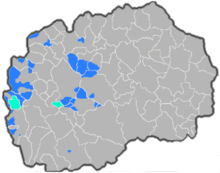Torbeschen
The Torbeschen ( Macedonian : Торбеши, Torbeshi; in North Macedonia also called Macedonian Muslims [Македонци-муслимани, Makedonci Muslimani]) are an ethno-religious minority in North Macedonia . They speak the Macedonian language and belong to Islam (see Islam in North Macedonia ).
In older sources they were also referred to as pomaks and are closely related to the Gorans in Kosovo . The Torbeschen live mainly in the western regions of the country around Debarska Zupa , Drimkol , Reka and Golloborda (Albania) .
origin
The Torbeschen are mainly descendants of Orthodox Slavs who converted to Islam during the Ottoman rule . The Sufi order of the Khalwati , Rifa'is and Qadiris played a major role in proselytizing the population.
Settlement areas
The greatest concentration of Torbeschen can be found in the west of North Macedonia and in the east of Albania. Villages in the Debar region are exclusively inhabited by Torbeschen. A large number of Torbeschen live in the municipality of Struga , especially in the villages of Labunishta , Oktisi , Podgorci and Boroec .
population
The exact number of the population is difficult to estimate. The historian Ivo Banac estimated that around 27,000 Torbeschen lived in old Yugoslavia before the Second World War . Subsequent censuses produced very different numbers; 1,591 around 1953, 3,002 around 1961, 1,248 around 1971 and 39,355 around 1981. The latter also includes those who previously identified themselves as Turks . The Association of Macedonian Muslims claims that over 70,000 Torbeschen have been assimilated since the Second World War and have taken on a different nationality, most of them now declaring themselves as Muslim Macedonians in North Macedonia.
The number of Torbeschen in Macedonia was estimated at around 40,000 in 2013.
Web links
- Minorities in Southeast Europe - Muslims of Macedonia . In: Center for Documentation and Information on Minorities in Europe - Southeast Europe (CEDIME-SE). (PDF file, 165 kB)
Individual evidence
- ↑ Jane K. Cowan: Macedonia: The Politics of Identity and Difference . In: Anthropology, Culture and Society . Pluto Press, 2000, ISBN 0-7453-1589-5 , pp. 111 ( online version [accessed February 9, 2014]).

